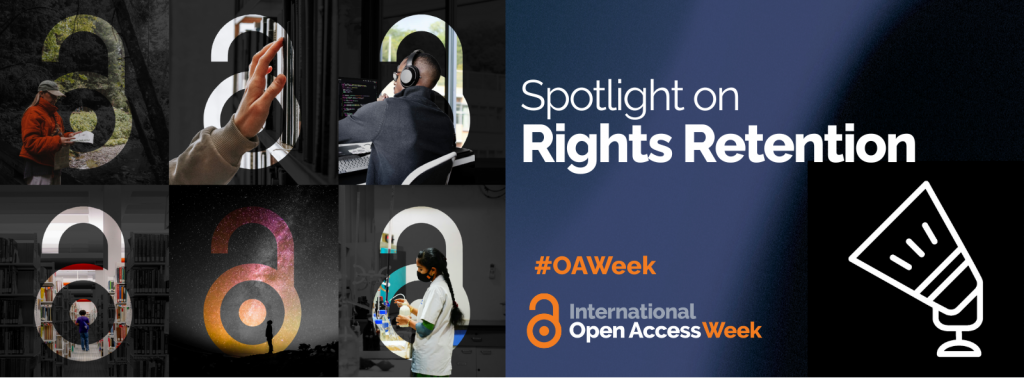Open Access Week 2025, October 20-26
Making research outputs freely available online benefits both individual researchers and society. Yet, in 2024, only 47% of all published research articles were open access (Herb, 2025). So why aren’t all articles open access? The reasons are wrapped up in the for-profit scholarly publishing model, university ranking systems and copyright ownership.

What is ‘rights retention’?
The practice of researchers keeping copyright over their work, even after it has been accepted for publication.
Why is it important to retain copyright?
Often researchers give away their copyright during the article publication process. This gives publishers full control over how a work is accessed and used. In some cases, even the authors themselves cannot share or reuse their own articles without permission. Rights retention shifts control back to researchers.
How can you retain your rights?
Option 1 – Select an open access journal that does not require copyright transfer and avoids excessive Article Processing Charges (APCs).
Option 2 – include this Rights Retention Statement (RSS) with your manuscript submission:
“For the purposes of open access, the author has applied a Creative Commons Attribution (CC BY) licence to any Author Accepted Manuscript (AAM) version arising from this submission.”
This ensures that your peer reviewed final manuscript, the AAM, has a CC BY licence. When your article is published you can deposit your AAM in an open repository for sharing.
What is an open repository?
A freely accessible digital archive for research outputs. Every university has one. Ours is called CRO.
Institutional and funder support
Many universities and research funders include rights retention in their open access policies. This institutional backing strengthens the researcher’s position, making it harder for publishers to challenge rights retention statements. Legally, it reinforces the prior intellectual property (IP) agreement between researcher and institution, which cannot be overridden by a publisher.
Join the coversation
Come along to Rights Retention: You wrote it. Who owns it?, a presentation from our Copyright and Open Content Librarian, Jane Bowland on Tuesday October 21, 2025, 1-1.45pm AEDT.
Check out our Open Access Week Schedule for more events and professional development opportunties.
Learn more
There are many excellent resources on rights retention. We recommend starting with these:
- Rights retention: Crucial for research [YouTube 2:21 mins] Stephen Eglen, Professor Computational Neuroscience, University of Cambridge. March 2024.
- What is Rights Retention? [Webpage] University of Melbourne. April 2025.
- Own Your Words: Publish your research with Rights Retention, [Library blog] University of Aberdeen, Feb 2025.
- Owning Knowledge: University Open Access Publishing [Website] an ARC funded project looking at a sector wide approach in Australian universities. 2025.
Discover more from Charles Sturt University Library Blog
Subscribe to get the latest posts sent to your email.